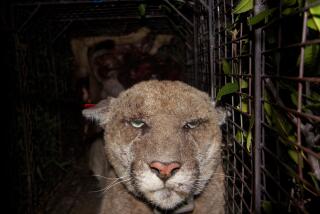Lack of Bait Suspends Coyote Deterrence Test
- Share via
An experimental program to deter coyotes from attacking household pets is in limbo because the bait--dog and cat carcasses--is no longer available.
City Manager Fred W. Maley told the City Council this week that because the experiment relies on carcasses--laced with lithium chloride--the program cannot proceed.
“That source is extremely difficult to find,” Maley said.
An arrangement with an unidentified supplier of carcasses ended in late August, Maley said. He declined to elaborate.
Officials proposed the experiment in June 1997 following public outcry about coyote attacks on pets. The experiment tests whether coyotes, after becoming sickened by eating the laced carcasses, will stay away from homes and pets.
But the experiment faced several obstacles, including waiting for a state-approved permit and getting volunteers to help.
“It’s been a very difficult process,” said Councilman Barry L. Denes, who requested a status report about the experiment. “Any time we seem to make any advance, we step back a couple feet.”
Behavioral psychologist Stuart A. Ellins received state approval for the experiment in May. His permit expires Nov. 30.
In August, Ellins, a professor at Cal State San Bernardino, started the food aversion experiment after volunteers from People for the Ethical Treatment of Animals stepped forward to assist. Ellins is not receiving pay for his work, but the city is reimbursing him for expenses.
The experiment lasted only a month, too short a period, officials said, to produce results.
Unless the city can find a source for bait, it is uncertain whether the experiment will continue, Maley said.
Denes said he supports continuing the program: “It’s certainly less extreme than the alternative” of trapping and killing coyotes.
More to Read
Sign up for Essential California
The most important California stories and recommendations in your inbox every morning.
You may occasionally receive promotional content from the Los Angeles Times.













